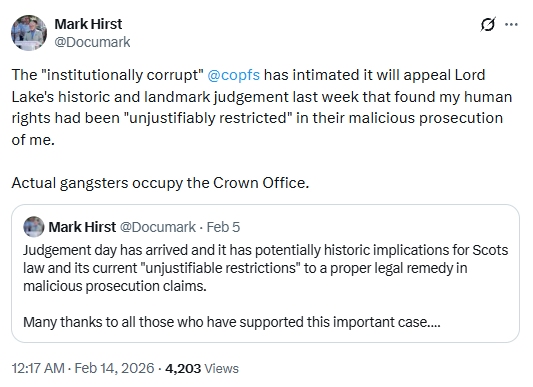HE HAS GONE AND DONE IT NOW
SARA SAWYERS EXPLAINS Scotland Needs No Permission? What is Blackford really talking about? Whether or not he fully understands it, he has just asserted the fundamental principle which underpins – The Scottish Constitutional Claim Among the central principles of the UK constitution, currently in force in Scotland as well as the rest of the UK,Continue reading "HE HAS GONE AND DONE IT NOW"
SARA SAWYERS EXPLAINS
Scotland Needs No Permission?
What is Blackford really talking about? Whether or not he fully understands it, he has just asserted the fundamental principle which underpins –
The Scottish Constitutional Claim
Among the central principles of the UK constitution, currently in force in Scotland as well as the rest of the UK, are a number derived from early English constitutional documents and arrangements. There are none, aside from sectarian principles, that derive from the Scottish corpus. This has given rise to a widespread fallacy that no such principles, or no equally relevant principles, exist for Scotland. When we apply the same criteria, however, to the constitutional documents and arrangements of Scotland prior to the Union, (1310 to 1706), as are afforded to their England counterparts for the same period, we find a core of self-consistent, constitutional principles which collectively reinforce and develop those expressed in the Claim of Right Act of 1689.
The UK constitution currently acknowledges none of these in practice. The UK Parliament operates, instead, under principles first established for the pre-Union, English Parliament, notably in the Bill of Rights of 1689, which introduced parliamentary privilege and the doctrine of parliamentary sovereignty.
Parliamentary sovereignty has been described as the central characteristic of the UK Parliament and yet it stands in direct opposition to the Scottish constitutional principle of popular sovereignty articulated in the Claim of Right. How, then, did it come to be universally applied? How did the authority of the Scottish people over their head of state and government come to be replaced by the supreme authority of an English government? The Bill of Rights did not feature in the terms of the Treaty of Union, while the Scottish Claim of Right Act was ratified by the parliaments of both England and Scotland, its continued force in Scotland guaranteed as a condition of the Union. Given this guarantee, not only is Scotland entitled to the continued provisions and force of the Claim of Right, but the Claim of Right itself is entitled to parity of standing with the English Bill of Rights within the UK Constitution.
The problem, of course, is how to have a single UK constitution when the core constitutional principles of the signatory nations are irreconcilable. As it was the Claim of Right which was ratified by both parliaments, however, it can be argued that if only one constitution from the two the nation signatories is to be applied in the UK, then the Claim of Right has the superior claim.
What is certain is that the force of the English constitution in Scotland, so far as it violates the guarantees of the Treaty and the provisions of the claim of Right cannot be lawful under either international, Treaty law or domestic, constitutional law.
The restoration of the Scottish constitutional compact, both implicit and explicit in the Claim of Right, represents the righting of a serious wrong committed against the people of Scotland. This wrong continues to the present and in clear violation of the precondition by which the Union was entered into.
More importantly, it guarantees not merely a route to independence should the majority in Scotland demand it, but the transfer of the power from the hands of an unaccountable few to the population as a whole. It holds out the promise of a restoration of accountability, justice and the reestablishment of the interests and welfare of the whole nation as the primary and inalienable obligation of law and government.
BEAT THE CENSORS
Sadly some sites had given up on being pro Indy sites and have decided to become merely pro SNP sites where any criticism of the Party Leader or opposition to the latest policy extremes, results in censorship being applied. This, in the rather over optimistic belief that this will suppress public discussion on such topics. My regular readers have expertly worked out that by regularly sharing articles on this site defeats that censorship and makes it all rather pointless. I really do appreciate such support and free speech in Scotland is remaining unaffected by their juvenile censorship. Indeed it is has become a symptom of weakness and guilt. Quite encouraging really.
FREE SUBSCRIPTIONS
Are available easily by clicking on the links in the Home and Blog sections of this website. by doing so you will be joining thousands of other readers who enjoy being notified by email when new articles are published. You will be most welcome.
What's Your Reaction?









































